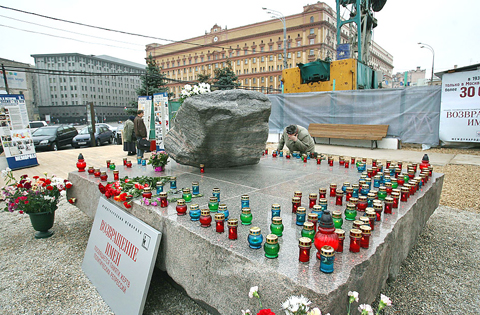A Russian historian investigating the fate of Germans imprisoned in the Soviet Union during World War II has been arrested in an apparent clampdown on historical research into the Stalin era by the Russian authorities.
Mikhail Suprun was detained last month by officers from Russia’s security services. They searched his apartment and carried off his entire personal archive. He has now been charged with violating privacy laws and, if convicted, faces up to four years in jail.
Suprun had been carrying out research into Germans sent to Russia’s Arctic gulags. A professor of history at Arkhangelsk’s Pomorskiy university, he was looking at German prisoners of war captured by the Red Army as well as Russian-speaking ethnic Germans, many from southern Russia, deported by Stalin. Both groups ended up in Arkhangelsk camps.

PHOTO: AFP
“I had been planning to write two books. I need another two or three years before I can finish them,” Suprun told the Guardian on Thursday.
The historian — who described his arrest as “absurd” — said he had signed an agreement with local officials not to talk further about his case.
But the arrest has provoked outrage in Germany and among leading historians. It comes amid attempts by the Kremlin to rehabilitate Stalin and to clamp down on independent historical research — with political repression during the Soviet era and victims of the gulag system now taboo topics.
The historian and writer Orlando Figes described Suprun’s arrest as unprecedented, and part of a “Putinite campaign against freedom of historical research and expression.”
Figes, professor of history at Birkbeck College, London University, said on Thursday: “[It’s] potentially quite alarming, if it means that the regime intends to clamp down on the collection of personal data about the Stalin terror.”
Russia’s FSB intelligence agency also arrested a police official who handed Suprun material from the local interior ministry archive.
It includes a list of 40,000 Germans deported to the Arkhangelsk region between 1945 and 1956. It details which camps they were sent to and whether they survived. The official, Colonel Alexander Dudaryev, is accused of abusing his position.
“What we are seeing is the rebirth of control over history,” said Rauf Gabidullin, of Arkhangelsk’s movement for human rights.
“The majority of Russians don’t have any idea of the scale of Stalin’s repression. Those in power are from the KGB. They don’t want people to know what their KGB predecessors were doing, or its huge scope,” Gabidullin said.
World War II remains a source of tension between Russia and its post-Soviet neighbors. Russian President Dmitry Medvedev has repeatedly accused Ukraine, Poland and other eastern European countries of distorting history for political purposes and in May set up a new state commission to prevent what he called the “falsification of history.”
Allison Gill, the director of Human Rights Watch in Moscow, on Thursday described the Suprun case as “very troubling.”
“It’s part of an attempt to provide a single narrative about what Russia was, and what it means today. It denies the full complexity of Russia’s history and the fact that individuals had vastly different experiences. I don’t like it at all,” she said.

A beauty queen who pulled out of the Miss South Africa competition when her nationality was questioned has said she wants to relocate to Nigeria, after coming second in the Miss Universe pageant while representing the West African country. Chidimma Adetshina, whose father is Nigerian, was crowned Miss Universe Africa and Oceania and was runner-up to Denmark’s Victoria Kjar Theilvig in Mexico on Saturday night. The 23-year-old law student withdrew from the Miss South Africa competition in August, saying that she needed to protect herself and her family after the government alleged that her mother had stolen the identity of a South

BELT-TIGHTENING: Chinese investments in Cambodia are projected to drop to US$35 million in 2026 from more than US$420 million in 2021 At a ceremony in August, Cambodian Prime Minister Hun Manet knelt to receive blessings from saffron-robed monks as fireworks and balloons heralded the breaking of ground for a canal he hoped would transform his country’s economic fortunes. Addressing hundreds of people waving the Cambodian flag, Hun Manet said China would contribute 49 percent to the funding of the Funan Techo Canal that would link the Mekong River to the Gulf of Thailand and reduce Cambodia’s shipping reliance on Vietnam. Cambodia’s government estimates the strategic, if contentious, infrastructure project would cost US$1.7 billion, nearly 4 percent of the nation’s annual GDP. However, months later,

North Korean leader Kim Jong-un renewed his call for a “limitless” expansion of his military nuclear program to counter US-led threats in comments reported yesterday that were his first direct criticism toward Washington since US president-elect Donald Trump’s electoral victory on Oct. 6. At a conference with army officials on Friday, Kim condemned the US for updating its nuclear deterrence strategies with South Korea and solidifying three-way military cooperation involving Japan, which he portrayed as an “Asian NATO” that was escalating tensions and instability in the region. Kim also criticized the US over its support of Ukraine against a prolonged Russian invasion.

Texas’ education board on Friday voted to allow Bible-infused teachings in elementary schools, joining other Republican-led US states that pushed this year to give religion a larger presence in public classrooms. The curriculum adopted by the Texas State Board of Education, which is controlled by elected Republicans, is optional for schools to adopt, but they would receive additional funding if they do so. The materials could appear in classrooms as early as next school year. Republican Texas Governor Greg Abbott has voiced support for the lesson plans, which were provided by the state’s education agency that oversees the more than